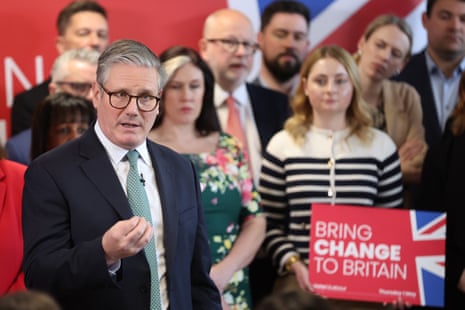Starmer says Trump tariffs are start of ‘new era’, and not just ‘short-term tactical exercise’
Some commentators have assumed that President Trump is just using tariffs as a negotiating ploy. Given that he has announced tariffs on Canada and Mexico, only to cancel them very quickly, there is a theory that he is doing the same thing again, only on a global scale. Alternatively, there is a view that a prolonged, negative reaction – falling share prices, rising inflation, higher unemployment? – could lead him to change his mind quite soon.
During the Q&A at the Labour local elections campaign launch earlier, Keir Starmer in effect rejected all these theories. He said that what Trump was doing was the start of “a new era”.
And he explicitly compared the challenge posed by Trump’s economic policies to the challenge posed by his security policies, which have led to European countries ramping up defence spending.
In response to a question from Sky’s Beth Rigby, Starmer said:
There’s a really important moment here that we need to understand, because over the last few months we’ve been talking about a new era when it comes to defence and security, and recognising that we are in a changing world, going into a new era, and therefore we have to act and lead differently.
We’re at a similar point for trade and the economy. This is not just a short-term tactical exercise. It is the beginning of a new era.
We need to understand that, just as we’ve understood it for defence and security. We have to understand the changing world when it comes to trade and the economy.
And I’m very concerned that we get this argument out there because it means that we have to adapt in ways which go beyond the mere question of tariffs.
And that’s why I’ve instructed my team to go further and faster on what we need to do to put more resilience and more strength into our economy.
But Starmer did not really explore what the policy implications of this were. In his comments about strengthening the economy, he mostly spoke about things the government is already doing, such as planning reform. Some parties, like the Liberal Democrats, the Green party and Plaid Cymru agree with Starmer about the UK facing a new era, and argue that it is one that requires rejoining the EU single market or the customs union, but Starmer has shown no inclination that he agrees, and instead says the UK should not choose between the US and Europe.

Key events
Early evening summary
-
Keir Starmer has said that the Trump tariffs are the start of a “new era”, and not just “a short-term tactical exercise”. (See 3.52pm.) He was speaking at Labour’s local elections campaign launch as Jonathan Reynolds, the business secretary, was in the Commons updating MPs on the government’s formal response to Trump’s plan. Reynolds said the government would consult on retaliatory tariffs, and his department later published a 417-page list of US goods that could theoretically be subject to tariffs. (See 2.15pm.) But the consultation will take four weeks, and the government says retaliatory tariffs remain would only be a “last resort”. The government is still committed to agreeing a trade deal with the US and Reynolds said he hoped this would lead to all tariffs being removed. (See 10.09am.) Starmer and Reynolds have played down concerns that this could involve the Online Safety Act being watered down, or big US tech companies having their liabilities under the digital services tax reduced, but they have not ruled out the proposed UK/US deal involving changes to these two policies.
Farage rejects Starmer’s claim he fawns over Putin
Nigel Farage, the Reform UK leader, has rejected Keir Starmer’s claim that he fawns over Vladimir Putin. In a video responding to what the PM said about him at the Labour local elections campaign launch (see 1.02pm), Farage said:
[Starmer] accuses us of falling over Putin. No, we think what Putin has done in Ukraine is absolutely wrong.
But, Prime Minister, are you really going to commit a large chunk of the British army to be in Ukraine for five, 10, or 20 or 30 years?
Trump tariffs could undermine Brexit deal in Northern Ireland
Donald Trump’s tariff plan could undermine the Brexit deal between the EU and the UK for trading arrangements in Northern Ireland, a highly sensitive agreement designed to maintain the 1998 peace pact, Lisa O’Carroll reports.
Neil Kinnock, the former Labour leader and European commissioner, has spoken about how glad he is that social media was not around when he was active in frontline politics. In a long and wide-ranging interview with John McFall, Lord Speaker in the House of Lords, for his Lord Speaker’s Corner podcast, Kinnock said:
I’m bewildered and to some extent intimidated by social media. And I just thank providence that it wasn’t even in existence when I was a member of parliament and when I was leader of the opposition, even when I was the European Commissioner.
I am so glad that we didn’t have this minute-by-minute opportunity for sniping and refusal to accept balance of argument, refusal to use what I consider to be the greatest human power of discernment, of judgement, which is fundamental, of course, to democracy and accountability.
There is a transcript of the interview here, and you can watch it here.
Unite says government should cut industrial energy costs to protect jobs in light of Trump tariffs
The Unite union wants the government to cut energy costs for manufacturers as a means of protecting jobs at risk from the Trump tariffs. In a statement, Sharon Graham, the Unite general secretary, said:
The government cannot allow a situation where yet again UK workers pay the price. It is likely that some employers will now use the issue of tariffs at the bargaining table, in an attempt to push down pay.
In an increasingly uncertain world the government has to step in and step up to protect UK workers and industry. This tariff announcement is a wake up call. Nothing should be taken off the table, we now need a package of measures to support UK manufacturing and jobs.
As a starter that must include reducing industrial energy costs, buying British and a total reform of ZEV [zero emission vehicle] mandates to protect not penalise UK car makers.
Northern Ireland faces “uncertainty and instability” because of the Trump tariffs, the first minister Michelle O’Neill said today.
At a press conference at Stormont, she said:
There is no doubt that the US market is an important market for us all, particularly across this island and these islands.
What has been announced yesterday is concerning, it creates instability, it is very much a race to the bottom.
It doesn’t serve anybody’s interests and I think it creates a period of uncertainty and instability in terms of the economy here …
It is very important we continue to be engaged both at a government level, with the Irish government, with the British government, with the EU level.
But also with our local business community here who are anxious about what this means for them.
We want to have a scenario where our bottom line is the protection of jobs, the growth of the economy. It is about ensuring we provide that certainty where we can.
Businesses in Northern Ireland face even more difficulty than their counterparts in England, Wales and Scotland because, under the post-Brexit trading rules for Northern Ireland, if the EU imposes retaliatory tariffs on US imports, firms in Northern Ireland importing US goods will have to pay those tariffs.
Most Britons (67%) thinks the Trump tariffs will be bad for the UK economy, a YouGov poll suggests. But only 38% of them think the tariffs will be bad for their own household finances.
Scottish Tory MSP quits party saying it has become ‘Trumpesque in style and substance’

Libby Brooks
Libby Brooks is the Guardian’s Scotland correspondent.
The only out LGBT+ Scottish Tory MSP has quit the party which he accuses of being in a “grotesque dance” with Reform.
In an excoriating resignation letter to leader Russell Findlay, Jamie Greene said that the party was becoming “Trumpesque in both style and substance”.
Explaining that he had joined the party under David Cameron and Ruth Davidson, “the party that supported gay marriage, in which minority communities were welcome, which pledged commitment to a net-zero environment and which was a political ‘big tent and broad church’”, he warned that “we now run the very serious and immediate risk of becoming once again the party of social division and morality wars.”
Greene, a highly able politician and thoughtful chamber contributor, was widely considered a rising star in the party before he was axed from the frontbench by former leader Douglas Ross, apparently in retaliation for Greene’s (qualified) support for gender recognition reform. Last autumn, he was an early candidate in the race to replace Ross, but stepped back in order to support party veteran Murdo Fraser, who lost to Findlay.
Attacking Findlay’s “Reform-lite” agenda, Greene added:
Chasing the votes of Reform party supporters will never see the Scottish Conservatives in government. There simply aren’t enough fringe rightwing Scottish voters to achieve that.
While Greene’s discomfort with the party’s direction of travel is not news, his decision to quit altogether is a significant indication of just how concerned and alienated the tranche of the Scottish party attracted by Ruth Davidson’s inclusive approach now feel.
The Liberal Democrats have described today’s government consultation on retaliatory tariffs against the US as “too little, too late”. Clive Jones, the Lib Dem trade spokesperson, said:
It is right that all options are on the table in response to Trump’s destructive trade war, but what the government has put forward is too little, too late.
This is work that should have been done as soon as Trump entered office and it appears ministers have been caught on the hop by this announcement.
It is time for UK to engage with our Commonwealth and European allies and bring together a coalition of the willing to stand tall against Trump’s trade war and protect our national interest.
Starmer says Trump tariffs are start of ‘new era’, and not just ‘short-term tactical exercise’
Some commentators have assumed that President Trump is just using tariffs as a negotiating ploy. Given that he has announced tariffs on Canada and Mexico, only to cancel them very quickly, there is a theory that he is doing the same thing again, only on a global scale. Alternatively, there is a view that a prolonged, negative reaction – falling share prices, rising inflation, higher unemployment? – could lead him to change his mind quite soon.
During the Q&A at the Labour local elections campaign launch earlier, Keir Starmer in effect rejected all these theories. He said that what Trump was doing was the start of “a new era”.
And he explicitly compared the challenge posed by Trump’s economic policies to the challenge posed by his security policies, which have led to European countries ramping up defence spending.
In response to a question from Sky’s Beth Rigby, Starmer said:
There’s a really important moment here that we need to understand, because over the last few months we’ve been talking about a new era when it comes to defence and security, and recognising that we are in a changing world, going into a new era, and therefore we have to act and lead differently.
We’re at a similar point for trade and the economy. This is not just a short-term tactical exercise. It is the beginning of a new era.
We need to understand that, just as we’ve understood it for defence and security. We have to understand the changing world when it comes to trade and the economy.
And I’m very concerned that we get this argument out there because it means that we have to adapt in ways which go beyond the mere question of tariffs.
And that’s why I’ve instructed my team to go further and faster on what we need to do to put more resilience and more strength into our economy.
But Starmer did not really explore what the policy implications of this were. In his comments about strengthening the economy, he mostly spoke about things the government is already doing, such as planning reform. Some parties, like the Liberal Democrats, the Green party and Plaid Cymru agree with Starmer about the UK facing a new era, and argue that it is one that requires rejoining the EU single market or the customs union, but Starmer has shown no inclination that he agrees, and instead says the UK should not choose between the US and Europe.
Keir Starmer
Plaid Cymru says the government should respond to the Trump tariffs by cutting trade barriers with the EU. Speaking in the Commons earlier, Liz Saville Roberts, the Plaid leader at Westminster, said:
Some commentators are fawning over a 10% tariff simply because our nearest neighbours have been hit worse.
Let’s get real here. The 25% tariff on steel and aluminium will hit Wales’s biggest export to the US – machinery and transport equipment.
And it’s a fact that the EU is Wales’s greatest trading partner with Welsh exports valued at £11.2bn.
In the face of an American president with an obsession with international economic revenge … it is economic common sense to accelerate scrapping trade barriers with Europe.
Luton airport allowed to double capacity after UK government overrules planners
Luton Airport will be allowed to almost double in capacity after the government overruled planning inspectors who recommended blocking the scheme on environmental grounds, Gwyn Topham reports.
On Wall Street, where the market has just opened, share prices are tumbling. Graeme Wearden has the details on his business live blog.
Government publishes 417-page list of US goods that could be affected by retaliatory tariffs as it opens consultation
The government has launched its online consultation on potential retaliatory tariffs against the US. There are details about how to respond here.
It includes a 417-page list of US goods that might be subject to tariffs. The government wants to know from businesses how they would be affected by particular tariffs. In its news release, the Deparment for Business and Trade (DBT) says:
UK companies are being invited to give their views on what any future UK response should look like by providing feedback to questions asking them the average value of their US imports, the impact of any possible UK tariffs and how they would adjust to them.
The department says the fact that an item is on the 417-page list “does not mean that it will appear in any UK tariff response, should the UK choose to impose tariffs on US goods at all”.
It also says the government would not impose tariffs on “products in the wider public interest issues such as medical supplies and military equipment”.
The consultaton will run for four weeks. But the government is not promising a speedy decision when it closes, on Thursday 1 May. “Once the request for input closes, the government will reflect on the feedback and consider how best to respond,” the department says.
The department also says tariffs are a “last resort”. Ministers are still hoping to a negotiate a deal with the US on trade that would lead to the current tariffs imposed on the UK being reduced or eliminated.










